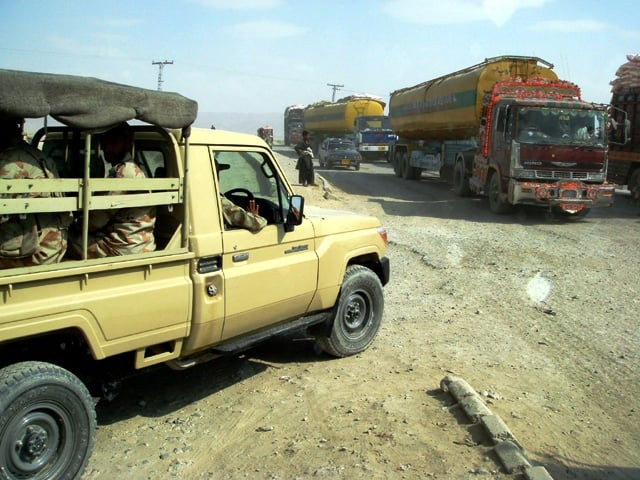Reading the fine print: Who will check the NATO containers for lethal weapons?
Loopholes in customs procedures allow the continued supply of lethal arms through Pakistan.

Reading the fine print: Who will check the NATO containers for lethal weapons?
While the US and Pakistan squabble over Nato supply routes, Islamabad is reported to have agreed in-principle to allow the transit of non-lethal supplies for US-led forces fighting in Afghanistan. One rather large problem with this: there is no provision under the present agreement to check the containers in the first place.
“The question whether only non-lethal supplies will be allowed to pass through would make sense only if we had the power to check the containers to begin with,” a customs official said.
Another customs official, who asked not to be named, said he suspected that the containers would be allowed to pass through unchecked, as it was done in the past. “Whether any new provisions have been made that allow us to examine and unseal the Nato/Isaf containers once they land at the Karachi port hasn’t been communicated to us as yet,” he said.
Moreover, a senior official who investigated the Isaf/Nato missing containers scam case says all the recommendations made in a report submitted to the Supreme Court remain unimplemented.
An estimated 15,000 containers meant for Isaf/Nato have been pilfered in Pakistan. This problem doesn’t look likely to go away. “Firstly, the government should make sure all such steps are taken before they reopen the route. Otherwise not only will weaponry continue to be transited through Pakistan, but also there is a real danger of pilferage of the containers within the country just like it had happened in the past,” the official said.
According to lawyers such as advocate Salim Salam Ansari, the jurisdiction of customs to check transit cargo is limited by the provisions of the Customs Act, 1969, read with the provisions of the Afghan Transit Trade Agreement (ATTA), 1965.
In fact, for the transit cargo of Isaf/Nato/US forces operating in Afghanistan, the ATTA is not even relevant and does not apply since this transit facility had been provided under a Government of Pakistan Memorandum of Understanding dated 19th June, 2002 with Isaf.
According to this MoU, the keywords ‘Inspection’ or ‘Examination’ of Isaf/Nato/US cargo are not specifically provided in the procedure. Experts say this loophole in the customs procedures for Isaf cargo gives ample opportunity to carry on the supply of lethal arms in the containers through Pakistan.
However, they say that while there is no explicit provision to enable customs to examine the Afghan transit cargo in Pakistan, the ATTA does provide for ‘Inspection’ of import cargo for Afghanistan and for both ‘Inspection’ and ‘Examination’ for export transit originating from Afghanistan.
Meanwhile, transporters lament that no representative of the government has approached them yet to address their security concerns before the Nato ground supply route is reopened.
The Pakistan Army’s National Logistics Cell was given the contract to supply the Nato forces in Aghanistan, which in turn sublets the contracts to these major transporters and others.
One transport company owner Taj Mohammad Afridi said he was fearful of the coming days. When asked what he thought would happen, he said “What do you think will happen. We will be told that the supply line is now open, so start your work. Then the Pathan will load the trucks. And then the Pathan will continue to die in this country. He will do this job because he is poor and wants to earn a better living for his family.”
The Oil Tankers Owners Association chairman Akram Durrani denied that anyone from the government had contacted the oil suppliers to discuss the imminent reopening of the supply route.
Published in The Express Tribune, May 23rd, 2012.



















COMMENTS
Comments are moderated and generally will be posted if they are on-topic and not abusive.
For more information, please see our Comments FAQ